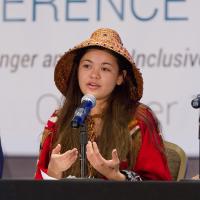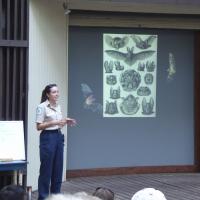
Overview
The Canadian Network for Environmental Education and Communication is a national charitable network devoted to promoting environmental literacy. Though there are no national EE mandates in Canada, provincial and territorial ministries of education are working with local school divisions to organize, deliver, and assess K-12 education. Some provinces and territories mandate environmental action projects or other priorities for K-12 and post-secondary education. The Sustainability and Education Policy Network is working on developing nationwide eco-certification programs at the K-12 level, outlets for sharing curriculum resources, nationwide support to aid in adopting and implementing sustainability policies, and innovative education policy and program designs. Currently, 7 of 13 provincial/territorial ministries have EE mandates in one or more domains (governance, curriculum, operations, research, etc.), and 10 provinces/territories have overarching curricular frameworks that integrate components of EE.
Policy & Practice
National Legislation
Approaches to curriculum policy and environmental education vary greatly across the provinces/territories. Most, if not all, provincial/territorial curricula include either goals or language relating to environmental education - to a greater or lesser degree. In many provinces, there is not an environmental education curriculum per se. Instead the approach to environmental education is disbursed - it appears as a topic within other subject curricula (e.g. math, science, etc.) Among the provinces, Manitoba is one that has taken a more active role in environmental education. For example, the Manitoba Department of Education, Citizenship and Youth has established a Sustainable Development Initiative (Unit), has developed a provincial Education for Sustainability Action Plan and has created an Education for Sustainable Development working group.
EE in K-12 Education
At the municipal level, individual school boards are responsible for implementing the provincial curriculum, and each board makes budget allocation decisions and chooses and/or develops their own curriculum materials. As such, they are a key player in how and to what degree environmental education is implemented in the schools. For example, school boards normally screen environmental education programs offered to students by outside agencies, and may distribute material within their district. A few school boards have created environmental educational resource positions. Some have prepared environmental reports. For example, the Toronto Region District School Board has produced an Environment Report and the Commission Scolaire de Montréal has developed a Sustainable Development Action Plan. School principals and teachers also play a key role in implementing the curriculum, and how environmental education is reflected in the classroom varies by school and class.
Professional Development
Most provinces have some kind of volunteer associations or networks of teachers that support environmental education. These groups usually focus on teacher professional development and networking, and in some cases include affiliates - those environmental educators not employed by the formal system. A few are specialist councils of the provincial teachers' union, composed of teachers with specific interest in environmental education. The union that represents teachers in Quebec, la Centrale des Syndicates du Québec (CSQ), plays a major role through its green schools program, Établissements verts Brundtland (EVB), which offers educational programs, teacher training and support, and certification/recognition of green schools. CSQ also acts as the Quebec Secretariat for Green Street. The Green Street program outside Quebec is hosted by the Canadian Teachers Federation (CTF), which is increasing its involvement in environmental education on various levels. A number of post-secondary institutions in Canada are involved in environmental education. For example, the Université du Québec à Montréal (UQAM) holds the only Canadian Research Chair in Environmental Education and offers both Masters and Doctoral Degrees, and Royal Roads University offers a Master’s Degree in Environmental Education.
Leadership
National Associations
Key national players that focus exclusively on environmental education include the Canadian Network for Environmental Education and Communication (EECOM), Learning for a Sustainable Future (LSF), and Green Street. Several associations work specifically to promote and advance environmental education in their provinces (e.g. Environmental Education Ontario, the Alberta Council for Environmental Education, and the Association québécoise pour la promotion de l'éducation relative à l'environnement -- AQPERE)
EE in the National Government
Environment and Climate Change Canada is the main federal player in environmental education, generally under the rubric of its sustainable development activities and goals. Environment Canada is collaborating actively with others to steward Canada's response to the UN Decade of Education for Sustainable Development (2005 - 2014) and with helping to move forward education for sustainable development in Canada. Direct federal involvement in formal environmental education is limited by its lack of constitutional authority for education. However, the federal government can and does work in this area through partnerships, facilitating working groups, etc. - and is an important player in this regard. The Council of Ministers of Education, Canada (CMEC), which is made up of the provincial/territorial ministers of education, includes education for sustainability within its mandate and has completed some survey reports on this topic. In addition, many provincial government departments of the environment have their own environmental education programs, sometimes with both a non-formal and formal component. Some other federal departments are also involved in environmental education including Natural Resources Canada (resources for teachers), Parks Canada (education and interpretation in parks and marine conservation areas), and Fisheries and Oceans Canada (local environmental education in coastal communities).
Organizations
Case Studies
This case study describes an urban and rural Indigenous land-based climate change education camp.

This case study explores Student Action for a Sustainable Future, a comprehensive environmental education program for middle school students that takes place in the city of Saskatoon, the largest city in the Canadian province of Saskatchewan.

此案例分析探討專為中學生所設計的全方位環保教育計畫「追求永續未來的學生行動」(Student Action for a Sustainable Future),此計畫在加拿大薩克其萬省 (S














